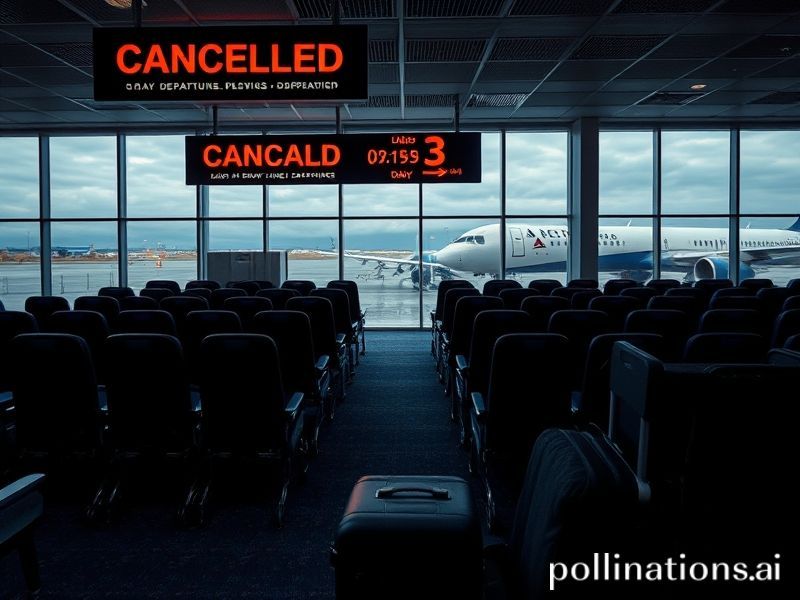When Delta Hit Delete: A Global Guide to One Airline’s Software Tantrum
Atlanta—Delta Air Lines, the self-declared “Keep Climbing” carrier, spent the weekend climbing only as far as the nearest gate agent’s apology podium. Roughly 6,000 flights—give or take a few hundred, because who’s counting when the app already crashed—were scrubbed after a routine software update turned into a transatlantic game of Jenga played with air-traffic control. Passengers from Lagos to London, São Paulo to Seoul, found themselves reenacting the human condition: standing in identical queues, staring at identical departure boards, and discovering that “SkyPriority” is Latin for “slightly less doomed.”
The immediate culprit was a botched changeover in crew-scheduling software, a program optimistically named “Crew Portal 360.” Apparently it took the “360” literally and spun every pilot and flight attendant in a full circle before vanishing. Delta insists the glitch was “not cyber-related,” which is corporate speak for “we did this to ourselves, but please don’t tweet the Kremlin.” Regardless, the ripple effects spread faster than a frequent-flyer’s sense of entitlement. By Sunday, stranded travelers in Paris CDG were offering baguettes on the black market; in Dubai, enterprising teens scalped sleeping-mat rentals for $50 a pop. Capitalism, like mold, finds a way.
Globally, the meltdown is a masterclass in how one airline can make the planet feel like a single, very angry terminal. Tokyo’s Haneda Airport turned into an impromptu capsule hotel; Nairobi’s Jomo Kenyatta briefly resembled a UNHCR staging ground, minus the tents but plus the despair. The European Union, ever eager to regulate the curvature of bananas, reminded Delta that EC261 compensation rules still apply—even if the delay originated in a server farm that smells suspiciously like Mountain Dew. Meanwhile, China’s state media seized the moment to suggest, with a straight face, that this would never happen on a glorious domestic carrier like Air China, conveniently forgetting last month’s weeklong fogathon in Beijing.
For the wider aviation ecosystem, the debacle is less about one airline’s software and more about the brittle optimism of modern logistics. We’ve built a world where a typo in Atlanta can ground a honeymoon in Bali—an achievement that would have impressed both the Wright brothers and the Four Horsemen. Industry analysts, who normally speak in euphemisms like “revenue headwinds,” admitted this was “a significant operational challenge,” which is analyst for “abject chaos.” Shares in Delta dipped only 3 percent, proving that Wall Street, like a seasoned traveler, has learned to shrug off turbulence as long as the dividends still taxi in on time.
The human fallout is predictably Dickensian. Business travelers discovered that Zoom works just as well from a baggage-claim floor; refugees from canceled connections formed micro-economies based on iPhone chargers and single-use deodorant. One enterprising coder in Mexico City set up a “Delta Survivors” Discord where members trade route hacks like wartime spies. Love stories bloomed between strangers who shared the last power outlet; divorces were filed over whose fault it was to book Delta in the first place. Somewhere in Johannesburg, a frequent flyer achieved Platinum Medallion status purely from delay vouchers—an accomplishment as hollow as it is shiny.
Climate advocates noted, with barely concealed glee, that grounding 6,000 jets spared the atmosphere roughly 400,000 tons of CO₂, or about the annual output of Iceland. Greta Thunberg retweeted the stat without comment, the digital equivalent of a slow clap. Airlines, for their part, have already scheduled “recovery flights” to mop up the backlog, burning the saved carbon in a single heroic swoop—proof that irony, unlike aviation fuel, remains endlessly renewable.
As the week begins and Delta’s CEO issues the requisite video apology from what looks like a Marriott suite, the globe returns to its normal state of mild dissatisfaction. Passengers will rebook, investors will forgive, and somewhere a programmer is already uploading “Crew Portal 361.” The lesson for the international traveler? Always pack patience, a power bank, and a worldview sturdy enough to survive the revelation that “Keep Climbing” is, in the end, merely marketing. The sky remains big, but the cloud it runs on is awfully small—and apparently just one bad patch away from a very long nap on the floor.







